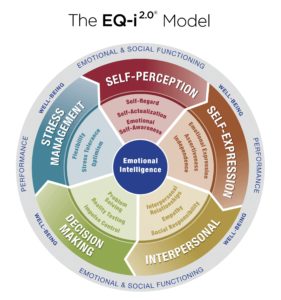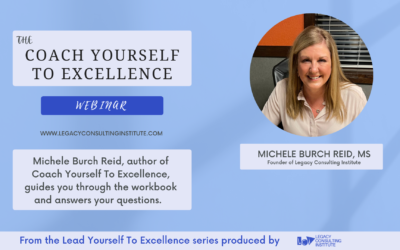Emotional Intelligence (EQ) Assessments Put To Work

MICHELE BURCH REID, MS FOUNDER OF LCI
One of my favorite strategies to use for Organizational Effectiveness and Personal Development is Emotional Intelligence Training.
Emotional Intelligence is a set of emotional and social skills that influence the way we perceive and express ourselves, develop and maintain social relationships, cope with challenges, and use emotional information in an effective and meaningful way.
The EQ-i 2.0 measures emotional intelligence (EI) and how it can impact people and the workplace by measuring our mastery of 15 skills. These 15 skills are divided into 5 categories/composites.
5 Composites of Emotional Intelligence
Self-Perception: How well you know yourself. This scale reveals how confident you are, how well you know and recognize your own emotions, and what influences them, as well as how willing you are to learn more about yourself and your emotional influences.
Self-Expression: How well you express yourself. It assesses your potential and ability to remain self-directed and openly expressive thoughts and feelings while communicating these feelings in a constructive and socially acceptable way.
Interpersonal: How well you manage relationships. This composite measures our ability to develop and maintain relationships based on trust and compassion; articulate an understanding of another’s perspective; and act responsibly while showing concern for others, a team, or a greater community/organization.
Decision Making: How well you use emotional information in the decision-making process. This scale reveals how well we understand the impact emotions have on decision making, including the ability to resist or delay impulses and remain objective so to avoid rash behavior and ineffective problem-solving.
Stress Management: How well you cope with emotions associated with change and unfamiliar or unpredictable circumstances while remaining hopeful about the future and resilient in the face of setbacks and obstacles.
The best part is that all of these Emotional Intelligence Skills can be completely learned, developed, and coached. I have seen the power of doing so. It is one of my greatest joys to see the impact that Emotional Intelligence training makes on my clients. It truly changes their lives in the most powerful and meaningful ways. I’ve seen clients take their power back because they have learned to set and keep boundaries in healthy ways. I’ve seen clients lead teams in greater capacities and in more joyful connections because they have learned the power of empathy. And the list goes on and on.
More From Michele
The Coach Yourself to Excellence Virtual Workshop
Watch Michele talk about her Coach Yourself to Excellence Workbook during her live virtual webinar. This is a great accompaniment to Michele’s workbook, Coach Yourself to Excellence. If you have purchased the workbook, this is a great guide to enhance your experience....
12 Quotes that Inspire An Attitude of Gratitude
1. “As we express our gratitude, we must never forget that the highest appreciation isnot to utter words, but to live by them.” — John F. Kennedy 2 "Gratitude is riches. Complain is poverty.” — Doris Day 3 “Appreciation is a wonderful thing. It makes...
Using Personality Type to Manage Stress
Start a new project "D" styles are direct, decisive, and task-oriented. Avoid micromanaging everything or doing everything yourself, as this will raise your frustration level. Get yourself involved in a new project or think of new ways to optimize and delegate some of...




